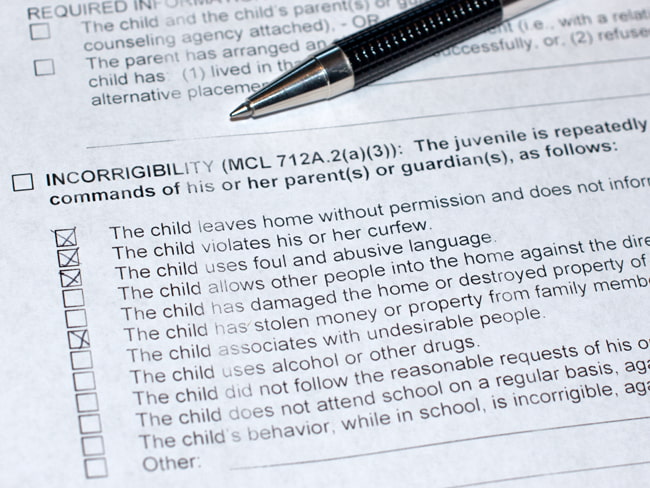






-

-
-
Maggie GeorgeRated by Super Lawyers
loading ...
Michigan Juvenile Defense Lawyer
When a juvenile or minor is charged with a crime, it is considered a special case in Michigan’s criminal justice system. Properly handling and defending against juvenile criminal charges is no easy task due to the extra layer of complexity of Michigan’s juvenile offender statutes. There is a significant amount of experience and expertise required to successfully help juveniles avoid going to criminal court and seek alternative solutions to criminal punishment, such as rehab, assistance or guidance programs.
Because of these challenges and the repercussions of a potential conviction, it is strongly recommended to work with an attorney specializing in juvenile criminal defense. The expert criminal defense attorneys at George Law have decades of combined experience defending juvenile clients against criminal charges. When you make the decision to work with our team, you can be assured we will work tirelessly to ensure the best possible outcome in your juvenile case.
Michigan Juvenile Law

The laws regarding juvenile offenses are outlined in the Michigan Juvenile Code MCL 712A.1-712A.32. There are several classifications for juvenile charges, below are the most common:
Juvenile Misdemeanor Offenses – These are crimes committed by minors who are under the age of eighteen. Juvenile misdemeanors can result in punishment of up to one year in juvenile detention. The most common examples of these misdemeanors include drunk driving, retail fraud, non-felonious assault and lower level drug charges.
Juvenile Felony Cases – As with adult felonies, juvenile felonies are much more serious than misdemeanor charges. As part of the process of juvenile felony cases, the minor charged will face a judge in juvenile court. The judge will then make the decision as to whether the case will be handled through juvenile court or if it should be transferred to the criminal court system that is used for adults. If the case goes to the regular criminal court system, the juvenile offender will be tried as an adult.
Civil Infractions – These are the least serious of all juvenile charges, and generally do not include a jail sentence. The most common of these are traffic tickets, however they can include other minor offenses. It should be noted that first offense Minor in Possession of Alcohol (MIP) offenses are now considered civil infractions instead of misdemeanors.
Underage DUI – As with all drunk driving offenses, Michigan has strict underage DUI laws. Although a conviction for underage DUI with a BAC of up to 0.07% does not automatically include jail time, it can include up to 360 hours of community service and a fine of up to $250. More serious or repeat DUI offenses can result in a minor being charged as an adult with the same set of sentencing guidelines, including incarceration.
Michigan Juvenile Court Process
The first step in the process after the initial investigation by law enforcement is the prosecutor reviewing the facts and circumstances surrounding the offense and deciding whether it should go to court. If there is a decision made to proceed with court action, the prosecutor will issue a delinquency petition to be filed with the Circuit Court’s Family Division. This formally initiates the court proceedings by allegining that the juvenile in question is in a state of delinquency and is being officially charged with the listed offense(s).
Once the case has been filed it is then transferred to a specialized part of the family court known as the juvenile court, which specifically deals in cases involving minors. The juvenile being charged is required to appear in front of a judge at the court for their initial hearing, where a decision will be made depending on the circumstances surrounding the offense and the offender’s prior history and demeanor. The possible outcomes of an initial juvenile court hearing include:
Case Dismissal – There are various different reasons a case can be dismissed by a judge. Technicalities, improper police actions or unsubstantiated accusations are the most common although there can be other reasons for case dismissal.
Proceeding with Charges – This places the case on a formal calendar for the court and officially will be going to trial.
Alternative Sentencing – This is used when it appears that the juvenile being charged has the possibility of turning their life around. Typically this involves programs such as youth assistance which helps delinquent youth avoid lifestyles and choices that can result in criminal behavior. Normally this type of sentencing is paired with juvenile probation.
Juvenile Diversion – This is a program where the youth is required to undergo counseling. Covered under the Juvenile Diversion Act, this is an alternative to regular sentencing and probation.
Criminal Court – In certain cases, a juvenile case will be transferred to a normal adult criminal court – where the minor will be charged as an adult. This is the most serious outcome possible, which makes the assistance of an experienced juvenile defense attorney all the more important.
Juvenile DUI Arrests
Drunk driving offenses by minors are considered to be some of the most egregious charges a juvenile will face. This is especially true in Michigan, which has some of the toughest drunk driving laws in the country. Receiving a DUI/OWI conviction at such a young age can potentially alter the course of a juvenile’s future, leading to struggles in gaining or retaining employment as well as potential legal restrictions on their freedom and mobility.
As with an adult DUI case, it is vital for juvenile drunk driving cases to be handled by an attorney with experience not only in juvenile criminal defense but also DUI cases. One of the strengths of George Law is the unique set of skills and experience our attorneys have working in both types of cases, giving them the ability to effectively defend juveniles from drunk driving charges and ensure the best possible outcome.
Criminal Defense Practice Areas
- Criminal Defense
- Sex Crimes
- Drug Charges
- Misdemeanor Offenses
- Domestic Violence
- Michigan Gun Law & Firearm Laws
- Rules for Transporting Firearms in Michigan
- Manufacture, Sale, Or Possession Of Illegal Weapons
- Carrying A Firearm Or Weapon With Unlawful Intent – MCL 750.226
- Possession Of A Firearm By A Felon In Michigan – MCL Section 750.224f
- Carrying Certain Concealed Weapons In Michigan – MCL Section 750.227
- Possession Of A Firearm During A Felony – MCL 750.227b
- Pointing Or Aiming A Firearm At Another Person – MCL 750.233
- Unlawful Firearm Transportation – MCL Section 750.227d
- Discharging A Firearm Without Malice – MCL Section 750.234
- Possession Of Short-Barreled Shotgun Or Rifle – MCL 750.224b
- Altering, Removing Identifying Marks On Firearms
- Discharging A Firearm In A Home Or Occupied Structure
- Homicide
- Juvenile Offenses
- Criminal Record Expungements in Michigan
- School Offenses
- White Collar Crime
- Violent Crimes
- Embezzlement
- Theft Crimes
- Michigan Felony Defense Lawyers
- Internet Crime / Cyber Crime
- Federal Crimes
- Probation Violations
- Traffic
- The Criminal Process in Michigan
Contact Details
Contact Us
Office Locations
- OFFICE ADDRESS
444 South Washington Avenue
Royal Oak, MI 48067
248-470-4300 - AVAILABLE 24/7
Call/Text My Cell: 248-470-4300
Fax: 248-381-8894
FREE Case Evaluation
To talk to an attorney today, call 248-470-4300,
or fill out our contact form

 Menu
Menu